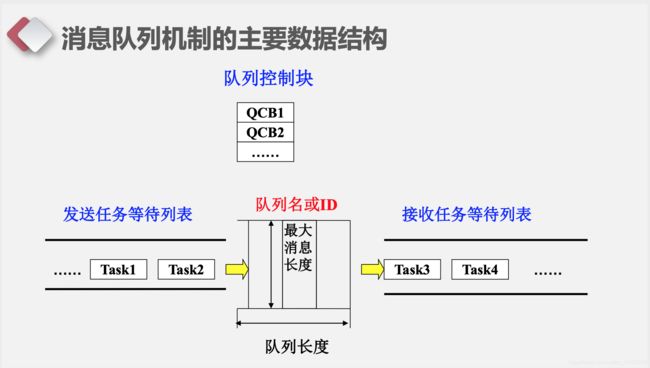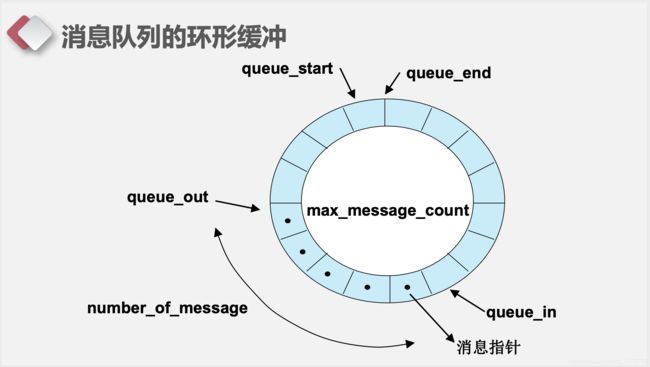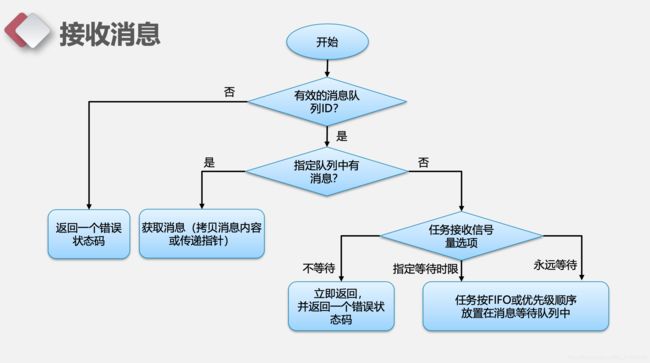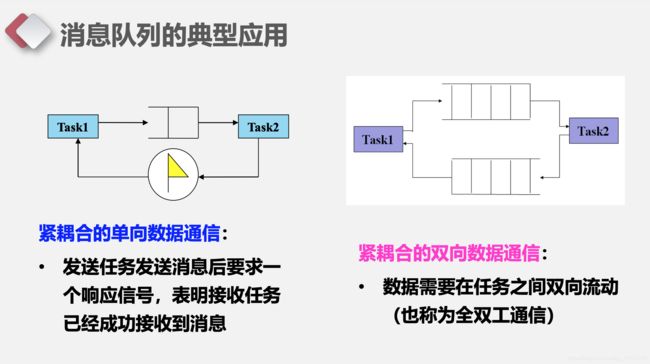uCos中的邮箱和消息队列
文章目录
- 1. 背景
- 2. 直接通信与间接通信
- 3. 消息机制
- 4. 消息队列
- 5. ucos-ii中实现
- 5.1. 任务创建
- 5.2. 发送消息
- 5.3. 等待消息
1. 背景
前段时间老师上课讲到了uC/OS中的邮箱和消息队列,所以我想要结合《μC/OS-III源码分析笔记》和中国大学MOOC-电子科技大学《嵌入式系统及应用》PPT写一篇笔记对这部分的内容进行总结。
2. 直接通信与间接通信
-
直接通信:在通信过程中双方必须明确地知道(命名)彼此。
- Send (P,message) – 发送一个消息到任务P
- Receive(Q,message) – 从任务Q接收一个消息
-
间接通信:通信双方不需要指出消息的来源或去向,而通过中间机 制来通信
- send(A,message) – 发送一个消息给邮箱A
- receive(A,message) – 从邮箱A接收一个消息
3. 消息机制
- 消息队列:属于间接通信方式
- 消息:内存空间中一段长度可变的缓冲区,其长度和内容均可以由用户定义和解释,其
内容可以是实际的数据、数据块的指针或空。 - 从操作系统观点看,消息没有定义的格式,所有的消息都是字节流,没有特定的含义。
- 应用可以只把消息当成一个标志,这时消息机制用于实现同步。
- 消息:内存空间中一段长度可变的缓冲区,其长度和内容均可以由用户定义和解释,其
- 消息机制可进一步分为:邮箱和消息队列。邮箱仅能存放单条消息, 消息队列可存放若干消息。
- 消息机制可支持定长与可变长度两种模式的消息。
4. 消息队列
Figure 1. 消息队列机制的主要数据结构 \text{Figure 1. 消息队列机制的主要数据结构} Figure 1. 消息队列机制的主要数据结构
- 消息队列控制块:管理所有创建的消息队列,系统运行时动态分配和 回收消息队列控制块。
- 消息队列缓冲区:存放该队列的消息内容。
- 如何进行消息的发送或接收?
完整的消息内容拷贝or传递指针(效率高、系统性能好、空间占用小)?
Figure 2. 消息队列的状态图 \text{Figure 2. 消息队列的状态图} Figure 2. 消息队列的状态图
Figure 3. 消息队列的主要数据结构 \text{Figure 3. 消息队列的主要数据结构} Figure 3. 消息队列的主要数据结构
Figure 4. 消息队列的环形缓冲 \text{Figure 4. 消息队列的环形缓冲} Figure 4. 消息队列的环形缓冲
Figure 5. 接收消息流程图 \text{Figure 5. 接收消息流程图} Figure 5. 接收消息流程图
Figure 6.消息队列的典型应用 \text{Figure 6.消息队列的典型应用} Figure 6.消息队列的典型应用
5. ucos-ii中实现
5.1. 任务创建
OS_EVENT *OSQCreate (void **start, INT16U size)
{
#if OS_CRITICAL_METHOD == 3 /* Allocate storage for CPU status register */
OS_CPU_SR cpu_sr;
#endif
OS_EVENT *pevent;
OS_Q *pq;
if (OSIntNesting > 0) { /* See if called from ISR ... */
return ((OS_EVENT *)0); /* ... can't CREATE from an ISR */
}
OS_ENTER_CRITICAL();
pevent = OSEventFreeList; /* Get next free event control block */
if (OSEventFreeList != (OS_EVENT *)0) { /* See if pool of free ECB pool was empty */
OSEventFreeList = (OS_EVENT *)OSEventFreeList->OSEventPtr;
}
OS_EXIT_CRITICAL();
if (pevent != (OS_EVENT *)0) { /* See if we have an event control block */
OS_ENTER_CRITICAL();
pq = OSQFreeList; /* Get a free queue control block */
if (pq != (OS_Q *)0) { /* Were we able to get a queue control block ? */
OSQFreeList = OSQFreeList->OSQPtr; /* Yes, Adjust free list pointer to next free*/
OS_EXIT_CRITICAL();
pq->OSQStart = start; /* Initialize the queue */
pq->OSQEnd = &start[size];
pq->OSQIn = start;
pq->OSQOut = start;
pq->OSQSize = size;
pq->OSQEntries = 0;
pevent->OSEventType = OS_EVENT_TYPE_Q;
pevent->OSEventCnt = 0;
pevent->OSEventPtr = pq;
OS_EventWaitListInit(pevent); /* Initalize the wait list */
} else {
pevent->OSEventPtr = (void *)OSEventFreeList; /* No, Return event control block on error */
OSEventFreeList = pevent;
OS_EXIT_CRITICAL();
pevent = (OS_EVENT *)0;
}
}
return (pevent);
}
5.2. 发送消息
INT8U OSQPost (OS_EVENT *pevent, void *msg)
{
#if OS_CRITICAL_METHOD == 3 /* Allocate storage for CPU status register */
OS_CPU_SR cpu_sr;
#endif
OS_Q *pq;
#if OS_ARG_CHK_EN > 0
if (pevent == (OS_EVENT *)0) { /* Validate 'pevent' */
return (OS_ERR_PEVENT_NULL);
}
if (msg == (void *)0) { /* Make sure we are not posting a NULL pointer */
return (OS_ERR_POST_NULL_PTR);
}
if (pevent->OSEventType != OS_EVENT_TYPE_Q) { /* Validate event block type */
return (OS_ERR_EVENT_TYPE);
}
#endif
OS_ENTER_CRITICAL();
if (pevent->OSEventGrp != 0x00) { /* See if any task pending on queue */
OS_EventTaskRdy(pevent, msg, OS_STAT_Q); /* Ready highest priority task waiting on event */
OS_EXIT_CRITICAL();
OS_Sched(); /* Find highest priority task ready to run */
return (OS_NO_ERR);
}
pq = (OS_Q *)pevent->OSEventPtr; /* Point to queue control block */
if (pq->OSQEntries >= pq->OSQSize) { /* Make sure queue is not full */
OS_EXIT_CRITICAL();
return (OS_Q_FULL);
}
*pq->OSQIn++ = msg; /* Insert message into queue */
pq->OSQEntries++; /* Update the nbr of entries in the queue */
if (pq->OSQIn == pq->OSQEnd) { /* Wrap IN ptr if we are at end of queue */
pq->OSQIn = pq->OSQStart;
}
OS_EXIT_CRITICAL();
return (OS_NO_ERR);
}
5.3. 等待消息
void *OSQPend (OS_EVENT *pevent, INT16U timeout, INT8U *err)
{
#if OS_CRITICAL_METHOD == 3 /* Allocate storage for CPU status register */
OS_CPU_SR cpu_sr;
#endif
void *msg;
OS_Q *pq;
if (OSIntNesting > 0) { /* See if called from ISR ... */
*err = OS_ERR_PEND_ISR; /* ... can't PEND from an ISR */
return ((void *)0);
}
#if OS_ARG_CHK_EN > 0
if (pevent == (OS_EVENT *)0) { /* Validate 'pevent' */
*err = OS_ERR_PEVENT_NULL;
return ((void *)0);
}
if (pevent->OSEventType != OS_EVENT_TYPE_Q) {/* Validate event block type */
*err = OS_ERR_EVENT_TYPE;
return ((void *)0);
}
#endif
OS_ENTER_CRITICAL();
pq = (OS_Q *)pevent->OSEventPtr; /* Point at queue control block */
if (pq->OSQEntries > 0) { /* See if any messages in the queue */
msg = *pq->OSQOut++; /* Yes, extract oldest message from the queue */
pq->OSQEntries--; /* Update the number of entries in the queue */
if (pq->OSQOut == pq->OSQEnd) { /* Wrap OUT pointer if we are at the end of the queue */
pq->OSQOut = pq->OSQStart;
}
OS_EXIT_CRITICAL();
*err = OS_NO_ERR;
return (msg); /* Return message received */
}
OSTCBCur->OSTCBStat |= OS_STAT_Q; /* Task will have to pend for a message to be posted */
OSTCBCur->OSTCBDly = timeout; /* Load timeout into TCB */
OS_EventTaskWait(pevent); /* Suspend task until event or timeout occurs */
OS_EXIT_CRITICAL();
OS_Sched(); /* Find next highest priority task ready to run */
OS_ENTER_CRITICAL();
msg = OSTCBCur->OSTCBMsg;
if (msg != (void *)0) { /* Did we get a message? */
OSTCBCur->OSTCBMsg = (void *)0; /* Extract message from TCB (Put there by QPost) */
OSTCBCur->OSTCBStat = OS_STAT_RDY;
OSTCBCur->OSTCBEventPtr = (OS_EVENT *)0; /* No longer waiting for event */
OS_EXIT_CRITICAL();
*err = OS_NO_ERR;
return (msg); /* Return message received */
}
OS_EventTO(pevent); /* Timed out */
OS_EXIT_CRITICAL();
*err = OS_TIMEOUT; /* Indicate a timeout occured */
return ((void *)0); /* No message received */
}
联系邮箱:[email protected]
CSDN:https://me.csdn.net/qq_41729780
知乎:https://zhuanlan.zhihu.com/c_1225417532351741952
公众号:复杂网络与机器学习
欢迎关注/转载,有问题欢迎通过邮箱交流。






